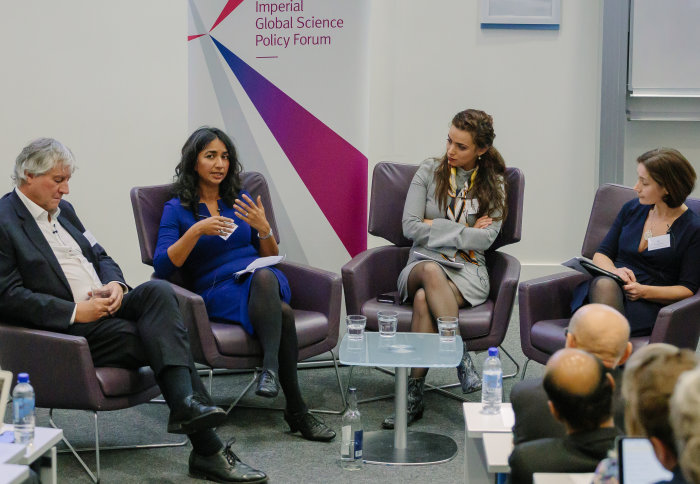Academic leaders discuss ways to support science after Brexit

Leading academics discussed the future of international science after Brexit, at the Imperial Global Science Policy Forum.
The Forum was held at the latest Imperial Lates event – Science without borders.
More than 250 people attended the session, including representatives from more than 40 embassies.

Vice Provost Professor Nick Jennings hosted the evening and said: “Imperial is one of UK's most international universities. Sharing and talking about our research is part of being a world leading university.
“Having diversity in our people and our research is central to what we do, and international collaboration is at the heart of what we do.
“Collaborating locally, nationally and internationally helps us do the best research, the best education and best exploit our results.”

Professor Sir Adrian Smith, Director and Chief Executive of the Alan Turing Institute, delivered the keynote address and spoke about options for the UK to maintain its position as a global leader in science in the event of leaving the EU.
Sir Adrian said: “Talent and greater agility might be the themes we need to gather round going forward.
“We’ve defined a set of structures in the UK, there’s no agility in the system. What we don’t have in structures is any form of agility to respond to opportunities internationally.

Sir Adrian said: “There’s got to be a big narrative and vision. Keep it simple, by whatever mechanisms there are, invent schemes that make you a magnet for global talent.”
Sir Adrian also suggested that the government would need to create its own, better version of the ERC if the UK was no longer able to apply for its grants. “Suppose there’s no access to the ERC after Brexit, we will have to invent our own. It’ll have to be bigger, brighter and pay better than the ERC”, he added.
A panel discussion to debate the future of science post Brexit followed. The panel was chaired by UUKi’s Vivienne Stern, included Sir Adrian, Imperial’s Royal Academy Enterprise Fellow Dr Enass Abo Hamed and science journalist and commentator Dr Anjana Ahuja.

Dr Abo Hamed, who is also the CEO of energy startup H2GO Power, said that her company wouldn’t exist if it weren’t for European Commission and UK funding.
Dr Abo Hamed said: “Starting a business is really hard, you need the right support around you to grow it. We need the recipe of success to be there to work hard and grow the business.”
Dr Anjana Ahuja, an Imperial alumna with a PhD in space physics, said: “It would be wonderful if more of our scientists were in a position of political power. I’ve been impressed with Imperial in terms of making the science relevant to global challenges.”
The Imperial Global Science Policy Forum
The Imperial Global Science Policy Forum is a high-profile programme of events designed to connect senior international science, education and innovation advisers to Imperial researchers, industry experts, and other relevant stakeholders including parts of UK Government.
Imperial Lates

Imperial Lates celebrate the latest in science and engineering at the College - bringing the public together with world leading minds in their respective fields, who not only love what they do, but also love sharing their work with new audiences.
Some of the exhibits included; low-cost prosthetics engineered in Cambodia and diet monitoring wearable tech trialled in Ghana, to oil-spill clean-up sponges developed in India.
In Europe, we will be exploring gardening therapy for patients in Italy and bumblebee surveys in Arctic Sweden, whilst saving a species of apple tree from extinction in central Asia.
The theme of the next event is ‘Infectious’ and takes place on 12th November 2019.
Register for the next event here
Article text (excluding photos or graphics) © Imperial College London.
Photos and graphics subject to third party copyright used with permission or © Imperial College London.
Reporter
Stephen Johns
Communications Division